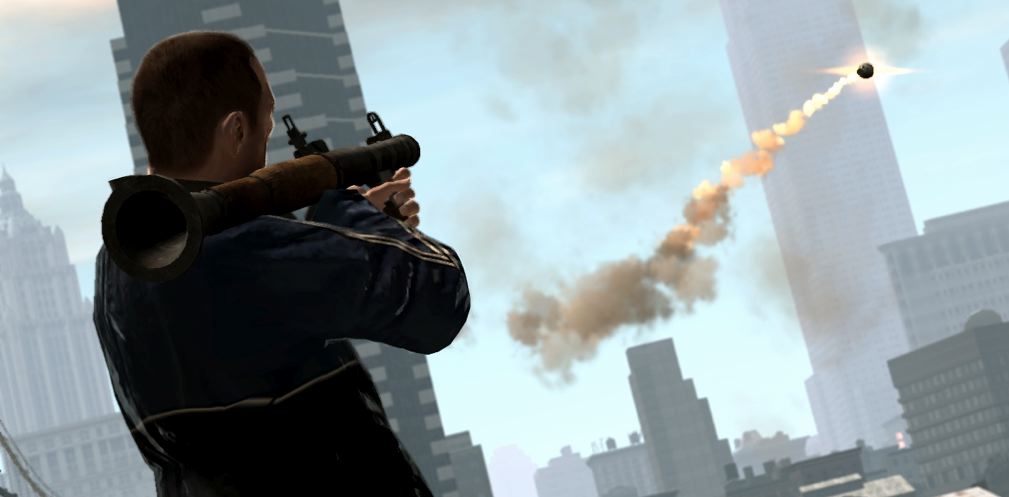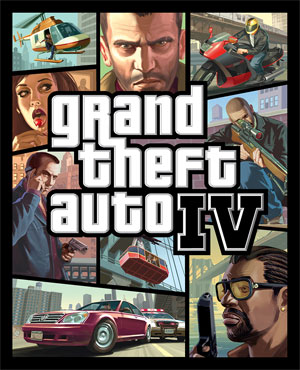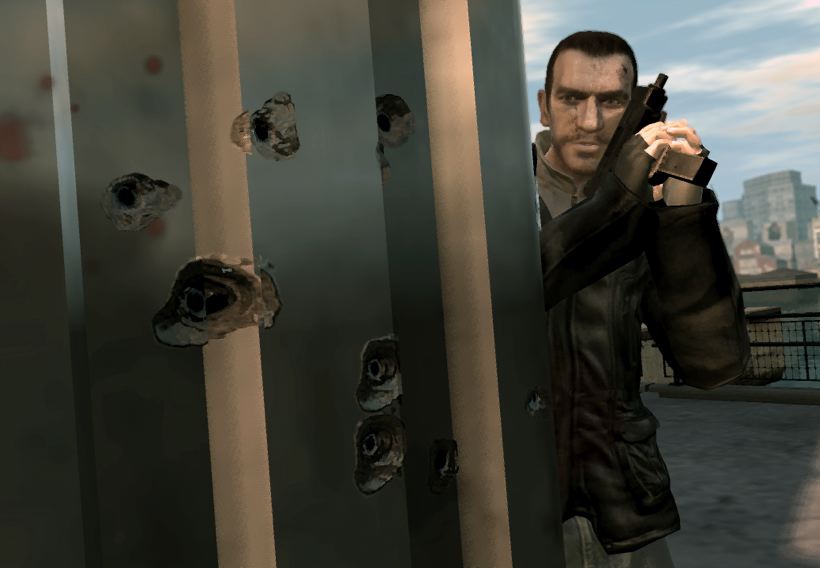
I missile you much: GTA IV‘s Niko Bellic sends his regards
The worst job I ever had was working in the car loans department of the now defunct Chemical Bank, at the Huntington Quadrangle in Melville L.I. It was a small office of about ten to twelve mutually limited, small-minded people, held under the managerial thumb of a doughy, mouse-faced, unsmiling, bespectacled woman with yellow smoker’s fingertips and a bad perm.
Our task was taking in loan requests by fax or phone from GMAC finance dealers, processing them, and passing them up the chain for approval. What I remember most was how tense this office was, as this woman kept us under the grind to turn out precious loan apps. My solace was ducking into my ’75 Impala at lunch time, loudly playing Grandmixer DXT and Herbie Hancock’s Future Shock album, and sleeping.
But pristinely nested on the other end of my employment karmic balance is the job I loved the most: The 2 1/2 years I spent, from 2004 – 2006, working in public affairs at Rockstar Games, maker of the Grand Theft Auto (GTA) series of video games.
In short, what we did was to talk to non-gamers about video games. At many shops, this would have been a nondescript, mundane occupation. At Rockstar, it was a never-ending adventure.
 The reason why was simple: As even people who’ve never played any of the titles in the hit, 65-million-copies-sold GTA series knows, Rockstar easily possesses the highest gamer-to-non-gamer noise-ratio in the business. Whenever we announced a new release, the gamersphere would go into overdrive, much as they’re doing now for the release, tomorrow, of Grand Theft Auto IV (PS3, Xbox 360) right and above. (Some analysts are estimating that the game, at $59.99 a copy, will ring in $400 million in sales the first week.) However, everybody else would go bonkers, too, especially people who blame videogames for everything from high school violence to low reading scores. (“We are calling on all major retailers to reconsider any decisions to sell this game,” demanded Parents Television Council president Tim Winter, on their web site with the announcement of IV. Yup: Definitely see that happening.)
The reason why was simple: As even people who’ve never played any of the titles in the hit, 65-million-copies-sold GTA series knows, Rockstar easily possesses the highest gamer-to-non-gamer noise-ratio in the business. Whenever we announced a new release, the gamersphere would go into overdrive, much as they’re doing now for the release, tomorrow, of Grand Theft Auto IV (PS3, Xbox 360) right and above. (Some analysts are estimating that the game, at $59.99 a copy, will ring in $400 million in sales the first week.) However, everybody else would go bonkers, too, especially people who blame videogames for everything from high school violence to low reading scores. (“We are calling on all major retailers to reconsider any decisions to sell this game,” demanded Parents Television Council president Tim Winter, on their web site with the announcement of IV. Yup: Definitely see that happening.)
We loved the excitement of fans, obviously, and, in truth, we actually didn’t so much mind the non-gamers. It was that, as I just said, we never seemed to run out of people who’d never played video games, but who “knew” what Rockstar’s games were “about,” and who wanted to [mis]inform the world. As well, these people—the ones without any information—seemed, typically, to talk the loudest. So, to counter this, we committed to telling our story, talking about the art, passion, humor, technology, and design that went into making games at Rockstar.
Now, I have to say something here. I’m well aware that I’m writing about games released by a company for whose media coverage I was once paid, and that, for this reason, I have a genuine credibility issue discussing this subject.
Because of this, let me be totally clear:
I had no interest in working for a video game company, and I have no interest in working for one again. (I left Rockstar during a downturn in the industry.) I went to Rockstar because, in the simplest sense of the word, if they’d not existed, I’d have been trying to force them into the universe.
 I mean, to my ears and eyes, Grand Theft Auto III was art, pure and simple. (The Design Museum in London took a similar position on Grand Theft Auto: Vice City at its release.) When I first heard about the game and how freely one could act in and interact with it, I literally was unsure I was understanding it correctly. By telling the story of fictional Liberty City, Rockstar not only somehow packed everything I wanted in a video game into one smooth experience—guns, cars, mayhem, and death—but they simultaneously declared a new age.
I mean, to my ears and eyes, Grand Theft Auto III was art, pure and simple. (The Design Museum in London took a similar position on Grand Theft Auto: Vice City at its release.) When I first heard about the game and how freely one could act in and interact with it, I literally was unsure I was understanding it correctly. By telling the story of fictional Liberty City, Rockstar not only somehow packed everything I wanted in a video game into one smooth experience—guns, cars, mayhem, and death—but they simultaneously declared a new age.
By pushing the walls back on video games, so that you could pretty much go anywhere you desired, over the area of an entire city—but expanded to an entire state in the majestic Grand Theft Auto: San Andreas—Rockstar completely redefined gaming.
 In this regard, working for the company was very much like working with Public Enemy in our salad days. In both contexts, the coolest part was watching the world change around you from the inside out. During my time at R*, as we often wrote our name, we oversaw the delivery and presentation of such works as San Andreas; Rockstar Games Presents Table Tennis, above, possibly the most unexpected, underrated game we put out while I was there; The Warriors, based the cult film; and the game which, without a doubt, commanded the longest and most startled response from the non-gaming public, Bully.
In this regard, working for the company was very much like working with Public Enemy in our salad days. In both contexts, the coolest part was watching the world change around you from the inside out. During my time at R*, as we often wrote our name, we oversaw the delivery and presentation of such works as San Andreas; Rockstar Games Presents Table Tennis, above, possibly the most unexpected, underrated game we put out while I was there; The Warriors, based the cult film; and the game which, without a doubt, commanded the longest and most startled response from the non-gaming public, Bully.
Set in a boarding school, Bully told the story of a young ne’er do well, Jimmy Hopkins, dropped off at historical Bullworth Academy by his mom and dad, in a typical white-upper-class, desperate “somebody do something with this kid” move. (In the game, his parents close the car door and peel out before Jimmy has even gotten to the school’s massive iron gates.)
Bully, again, was some kind of masterstroke, as its 2nd trailer makes clear. I mean, to begin, when was the last time you heard of a video game set in a school? But, in a way, the international furor which proceeded as soon as people knew Rockstar was coming out with a game called Bully—with that name, even before they knew anything else about the game—sort of typified what it was like working at Rockstar.
In short, I loved it. You had to bring your A-game every day, and you had to speak out for culture in which you deeply believed. In other words, what I enjoy doing anyway.
 Now—sniff! sniff!—I’m watching the release of the next installment in the GTA chronicles from the outside. IV‘s story focuses on Niko Bellic, right, an Eastern European immigrant who comes to America, expecting wine, women, and song. Soon enough, though, Niko learns that America opens up widest to the one who fires the most bullets. Niko immediately begins to work on becoming the best American he can.
Now—sniff! sniff!—I’m watching the release of the next installment in the GTA chronicles from the outside. IV‘s story focuses on Niko Bellic, right, an Eastern European immigrant who comes to America, expecting wine, women, and song. Soon enough, though, Niko learns that America opens up widest to the one who fires the most bullets. Niko immediately begins to work on becoming the best American he can.
Highly recommended: This massive Edge magazine interview with Sam Houser, executive producer on GTA IV, and co-founder / president of Rockstar. Sam and his brother, Dan, built the company, and form Rockstar’s resident brain trust. The piece, along with this part 2, opens up the thinking behind Rockstar’s games, revealing the degree to which Sam and Dan don’t even really see other games as their competition, but movies, instead. For example, says Sam, while watching
Eastern Promises, David Cronenberg’s 2007 movie focusing on the very type of gangster figures that feature in GTA IV.
“I was nervous about watching it, thinking that he was really going to hand us our heads on a plate in term of delivering the vibe. Cronenberg’s like the master of atmosphere. So I thought: this is going to be scary. And yes, he’s got some good Russian vibes in there, he’s definitely taken with the same things that we’re taken with – all the tattoos and the craziness, he’s definitely got. The only criticism I would give him – and he is one of my absolute favourite film makers; Dead Ringers is one of my absolute favourite films of all time – is that Viggo Mortensen is Danish American, or something like that; he sure as hell is not eastern European. He’s good, but he’s not eastern European. And the other main character is played by Vincent Cassel, who is a good actor, but he’s French. So the two lead Russians are not played by Russians, and they don’t sound Russian to me. Vincent sounds like a French bloke doing a Russian accent – I can hear the French in him. And when I came back to our game, Vlad and Faustin, the two heavyweight Russian guys in the game, are very real, very Russian, and very f—ing scary.
Hey: If you’ve read this far, maybe you’ve got what it takes to work in Liberty City as a member of the LCPD! Why don’t you check out this brief recruiting video, or other footage on the site? I’ll see you there!

1 comment so far ↓
I don’t play video games often because I don’t own a major console and I choose not to. But when I do play some games, I can play for hours. With that said, I can play GRAND THEFT AUTO for days when I have the time and opportunity.
The great thing about GTA is the many options, metropolitan minutia, design and the actual game play. I often fight with myself on whether or not I should buy a console and get all of the GTA series. Alas, time is precious and I can not make enough time (8-12 hours straight) to truly enjoy GTA.
Great article, and thanks for links.
Leave a Comment